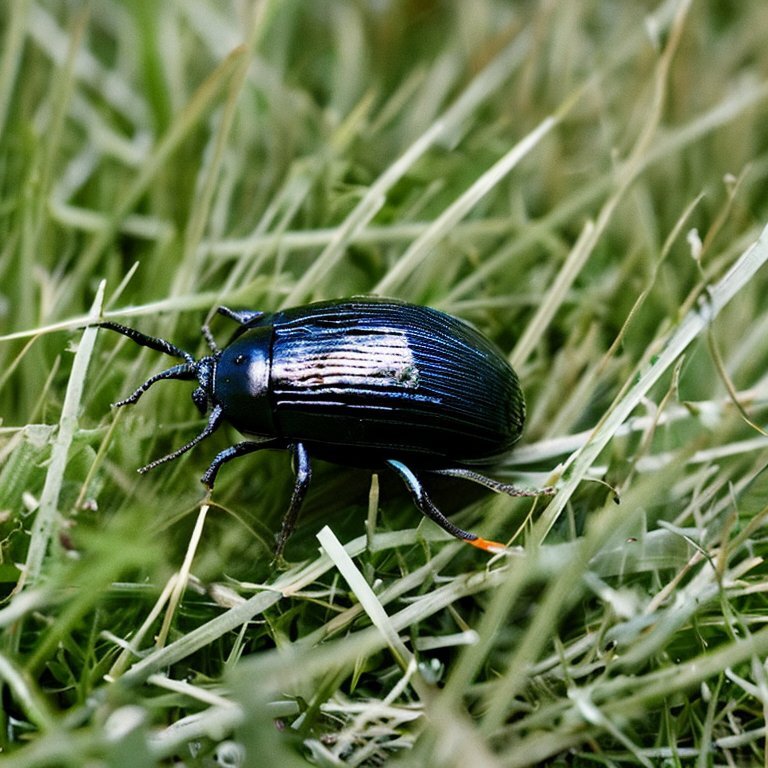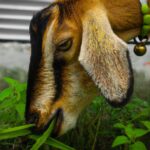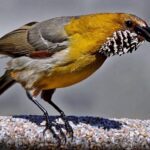
In this post, we will explore if beetles eat grass, as well as other questions about what they eat, including plants and grass seed.
Do Beetles Eat Grass?
Beetles can eat grass, but it is not a common occurrence for most species of beetles. Beetles are a diverse group of insects with a wide variety of dietary habits. While some beetles are known to feed on grass, the majority of them do not.
One example of a beetle that feeds on grass is the Japanese Beetle. The Japanese Beetle is a common pest of lawns and gardens, and it feeds on the leaves, flowers, and fruit of various plants, including grass. The adults can cause significant damage to lawns and gardens by skeletonizing the leaves of grass, leaving only the veins. The larvae, or grubs, of the Japanese Beetle feed on the roots of grass and other plants, causing damage to the plants and making them more susceptible to drought and disease.
Another example of a beetle that feeds on grass is the Black Turfgrass Ataenius Beetle. This beetle feeds on the roots of warm-season turf grasses such as Bermuda, Zoysia and St. Augustine grass. The adults feed on leaves and flowers, and the larvae feed on roots. They are more prevalent in the southern states of the US, and damage can occur during the summer months.
Another example of a beetle that feeds on grass is the Billbug. The Billbug is a pest of several species of grass, including bluegrass, fescue, and ryegrass. The adults chew on the stem of the grass, while the larvae feed on the roots. They are prevalent in the central and southern states of the US.

While the above-mentioned beetles feed on grass, most species of beetles do not. Most beetles are generalist feeders, which means they feed on a wide variety of plants, or they have specific diet which is not grass. For example, some beetles feed on tree bark, leaves, flowers, or fruits, while others feed on other insects.
To protect grass from being eaten by beetles, it is important to maintain a healthy lawn by providing the grass with proper fertilization and water. Also, it is important to keep an eye out for signs of beetle damage such as skeletonized leaves, wilted plants, or brown patches in the lawn. If you notice any of these signs, it is important to identify the specific species of beetle that is causing the damage and take appropriate action, such as using pesticides or other control methods.
In summary, while some species of beetles can feed on grass, most do not. The Japanese Beetle, Black Turfgrass Ataenius Beetle and Billbug are examples of beetles that feed on grass, causing damage to lawns and gardens. To protect grass from being eaten by beetles, it is important to maintain a healthy lawn, keep an eye out for signs of damage and take appropriate action, such as using pesticides or other control methods.
What Do Beetles Eat and Drink?
Beetles, as a diverse group of insects, have a wide variety of dietary habits. Some beetles are herbivores and feed on plant material such as leaves, flowers, fruits, and roots. Other beetles are carnivores and feed on other insects and even other small animals like snails and slugs. Some beetles are scavengers and feed on dead plant or animal material while others are detritivores and feed on decomposing organic matter.
Herbivorous beetles that feed on plants can be further categorized based on their preferred host plants. For example, some beetles feed specifically on conifers, others on deciduous trees, and others on grasses or crops. Some beetles like the Japanese Beetle and the Black Turfgrass Ataenius Beetle, feed on specific types of grasses like Bermuda, Zoysia and St. Augustine.
Carnivorous beetles, such as ladybugs, are known to eat aphids, mites, and other small insects. Some beetles, like the Rove beetles, are known to feed on other insects like ants and termites. Some beetles, like the Carrion beetles, feed on dead animals, while others like Dermestid beetles feed on animal carcasses and dried animal products like skins and feathers.
Scavengers beetles like Silphidae feed on dead plant and animal material, and detritivores like the Rove beetles feed on decomposing organic matter.
Beetles drink water, some species drink from dew drops on leaves, others drink from standing water or from damp soil. Some species have the ability to extract moisture from the food they eat.
In summary, beetles have a wide variety of dietary habits, they can be herbivorous, carnivorous, scavengers or detritivores, and their diet can vary based on the species. Beetles drink water, and some species have the ability to extract moisture from their food.
Do Beetles Eat Plants?
Yes, many species of beetles eat plants as part of their diet. Beetles are a diverse group of insects, and different species have different dietary habits. Some beetles are herbivorous, which means they feed on plant material such as leaves, flowers, fruits, and roots.
Herbivorous beetles can be further categorized based on their preferred host plants. For example, some beetles feed specifically on conifers, others on deciduous trees, and others on grasses or crops. Some beetles like the Japanese Beetle and the Black Turfgrass Ataenius Beetle, feed on specific types of grasses.
Some examples of plant-eating beetles include:
- The Colorado potato beetle, which feeds on the leaves of potato plants and can cause significant damage to crops.
- The elm leaf beetle, which feeds on the leaves of elm trees and can defoliate the tree.
- The rose chafer, which feeds on the leaves and flowers of roses and other plants.
- The asparagus beetle, which feeds on the leaves and spears of asparagus plants.
- The cucumber beetle, which feeds on the leaves, stems, and fruit of cucumber plants and other members of the cucurbit family.
Herbivorous beetles can cause significant damage to plants, and in some cases, can even kill them. To protect plants from being eaten by beetles, it is important to keep an eye out for signs of beetle damage such as skeletonized leaves, wilted plants, or brown patches in the lawn. If you notice any of these signs, it is important to identify the specific species of beetle that is causing the damage and take appropriate action, such as using pesticides or other control methods.
In summary, many species of beetles eat plants as part of their diet. Beetles can be herbivorous and feed on various types of plants, including conifers, deciduous trees, grasses, and crops. They can cause significant damage to plants and it is important to protect plants from being eaten by beetles by identifying the specific species of beetle and taking appropriate action such as using pesticides or other control methods.
Do Beetles Eat Grass Seed?
Some species of beetles can eat grass seed, but it is not a common occurrence for most species of beetles. Grass seed is typically used for landscaping and lawn maintenance, and is not a primary food source for most beetles. However, there are some beetles that may be attracted to grass seed, particularly those that feed on plant material.
Another example of a beetle that may eat grass seed is the Black Turfgrass Ataenius Beetle. This beetle feeds on the roots of warm-season turf grasses such as Bermuda, Zoysia and St. Augustine grass. The adults feed on leaves and flowers, and the larvae feed on roots. They are more prevalent in the southern states of the US, and damage can occur during the summer months.
While the aforementioned beetles may eat grass seed, most species of beetles do not. Most beetles are generalist feeders, which means they feed on a wide variety of plants, or they have specific diet which is not grass. For example, some beetles feed on tree bark, leaves, flowers, or fruits, while others feed on other insects.
To protect grass seed from being eaten by beetles, it is important to keep the area free from debris, which can harbor pests. The use of pesticides can also help to control beetles that may feed on grass seed, however, this should be done with caution, as pesticides can harm beneficial insects and other wildlife. It’s also important to maintain a healthy lawn by providing the grass with proper fertilization and water.
In summary, while some species of beetles can eat grass seed, most do not. Most beetles are generalist feeders, which means they feed on a wide variety of plants, or they have a specific diet that doesn’t include grass seed.
Lance has been passionate about the plant-based diet and we have been following a whole food plant-based diet for over 5 years. We focus on health, natural healing, weight management, animal rights, and the health of the planet and environment by focusing on whole plant-based foods and sustainable practices.
Learn more at the About Me page and follow on social media at the links below.




